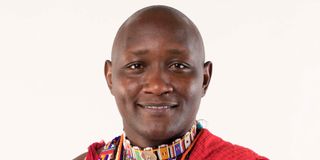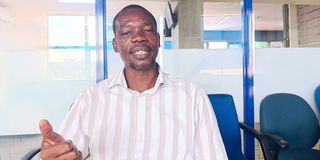Champions of change: Four men who stood up for women in 2024

From left: Dr Gitahi Githinji, George Alambo, Dooso Radido and Jeremiah Kipainoi. The four men are celebrated as champions of gender equality.
What you need to know:
- In 2024, four Kenyan men emerge as champions of gender equality: Dr Gitahi Githinji implementing progressive workplace policies at Amref, Jeremiah Kipainoi fighting FGM through social media activism, George Alambo securing land rights for widows, and Dooso Radido amplifying women's voices through publishing.
- Against a backdrop where Kenyan women face significant challenges—these male allies are using their platforms to challenge systemic barriers and advance women's rights.
In the fight for gender equality, a wave of male allies has emerged, reshaping societal norms and challenging systemic injustices. While women still shoulder the brunt of advocacy, the inclusion of men in this struggle is critical to dismantling entrenched power structures and fostering more inclusive communities. Around the world, countless men are stepping up as collaborators and using their platforms, skills, and influence to advance the cause of gender equity.
In Kenya, the numbers speak volumes about the urgency of this fight. Approximately 23 percent of women aged 15–49 have experienced some form of gender-based violence, and harmful practices like female genital mutilation (FGM) still affect one in five girls in certain regions. Widows, too, remain among the most vulnerable, often disinherited and left destitute. These grim realities highlight the need for both men and women to work together in advocating for equality and justice.
Against this backdrop, four remarkable Kenyan men — Dr Gitahi Githinji, Dooso Radido, Jeremiah Kipainoi, and George Alambo — stand out as champions of women’s rights. From transforming workplace policies to rescuing girls from FGM, amplifying women’s voices in literature, and restoring land rights to widows, their efforts represent the profound impact male allies can have.
Jeremiah Kipainoi

Jeremiah Kipainoi leverages social media to combat FGM.
Jeremiah Kipainoi’s work in combating female genital mutilation (FGM) is deeply personal. Although FGM was normalised in his early years, his career in radio journalism exposed him to its devastating consequences. Meeting survivors and cutters gave him a visceral understanding of its impact, transforming him into a relentless activist.
“Hearing their stories, seeing their scars — it was devastating. This wasn’t just a cultural practice; it was a profound violation of human rights,” he recalls.
Kipainoi’s activism is a blend of grassroots engagement and technological innovation. During the pandemic, he launched End FGM Live, a social media campaign that connected activists, NGOs, and community leaders. “Covid-19 couldn’t be an excuse to stop. Social media became our battleground, allowing us to raise awareness, mobilise resources, and save young girls from this inhumane practice,” he explains.
Through his work, Kipainoi has directly contributed to rescuing thousands of girls from FGM, but the journey is far from over.
“One of the biggest hurdles is coordination. We need better synchronisation between activists, police, and community leaders to make meaningful progress,” he says.
His journey is not without challenges. Balancing his career with activism often drains personal resources. Yet, his determination remains unwavering. He dreams of a day when communities view FGM as a social and economic liability and when the police respond without hesitation or external prompting
Beyond rescues, Kipainoi focuses on fostering cultural change.
“Ending FGM isn’t just about enforcing laws — it’s about changing mindsets. Communities must see FGM as their problem to solve,” he argues.
His message to women is both empowering and urgent: “Speak out. Your voice can change lives and inspire generations. Together, we can end FGM,” he urges.
George Alambo

George Alambo, Western Kenya Human Rights Network chairperson during an interview at the Nation Media Group offices in Kisumu.
In Western Kenya, where widow disinheritance is alarmingly common, George Alambo has become a steadfast ally for some of society’s most vulnerable. For over a decade, the chairperson of the Western Kenya Human Rights Network, has fought to secure land rights for widows in Nyanza and Western Kenya. His work stems from his early days in child protection.
“Observing widows thrown out of their homes after the deaths of their husbands galvanized me into action,” he intimates.
One unforgettable case involved a widow and her children evicted from their ancestral home by relatives claiming ownership. Witnessing their despair, Alambo intervened by rallying neighbours, elders, and local administrators. Through dialogue and legal advocacy, he restored the family’s rights.
“Seeing the widow regain her home was my greatest reward,” he reflects with a trace of joy in his voice.
The challenges he faces on this mission are numerous. “Many families resist intervention, and chiefs often lack the authority to enforce resolutions. Legal processes are prohibitively expensive for vulnerable families, leaving them without recourse,” he shares.
Despite these hurdles, he has built partnerships with local authorities and NGOs to provide legal and financial support. His efforts have resolved numerous cases across Migori, Kakamega, and Kisumu counties, setting a precedent for community-led justice.
His impact extends beyond individual cases. By organising public education campaigns and training sessions, he has raised awareness about widows’ rights. His advocacy has transformed local governance, prompting chiefs and county officials to prioritise land disputes involving vulnerable groups.
For Alambo, the work is deeply personal. “It’s not just about land; it’s about dignity,” he emphasises. His holistic approach — combining legal advocacy, community dialogue, and public education—has empowered widows to reclaim their rights and rebuild their lives.
Cultural resistance and unresponsive local authorities remain significant challenges, but Alambo is undeterred.
“Every piece of land returned is a victory for justice. It’s about restoring humanity, one widow at a time,” he concludes.
Dooso Radido

Dooso Radido, founder of ZionPearl Publishers
Dooso Radido, founder of ZionPearl Publishers, believes in the transformative power of storytelling to empower women. Radido launched the SheLeads initiative in 2022 to document the stories of women leaders.
“Women have incredible wisdom and experiences, but their stories are often untold. I wanted to change that,” he explains.
Since its inception in 2022, ZionPearl has published eight volumes featuring over 120 women, highlighting their achievements and struggles. The books have reached readers across Africa, the UK, and beyond, with more than 5,000 copies in circulation.
“We now have literature that truly reflects the local experiences of women,” Radido says proudly.
Beyond publishing, ZionPearl organises webinars, networking events, and mentorship programs for women. The upcoming SheLeads Annual Summit scheduled for early next year aims to gather more than 2,000 women for three days of empowerment and collaboration. “We’re not just telling stories; we’re building networks and raising role models,” he explains.
The journey has not been without obstacles. Many women struggle with impostor syndrome, doubting their abilities and hesitating to participate.
“While we have featured more than 120 women in our book volumes, an even bigger number has turned down our request to feature them.”
To address the financial hitch, Dooso has removed financial barriers, ensuring inclusivity in all projects, unlike at the beginning when the publication would cater for half the fees and the featured women would meet the rest of the charges.
“Women have wings; they just need to believe they can fly,” he reflects.
Dooso’s vision extends far beyond books. He envisions a centre for women’s empowerment, complete with training facilities and safe spaces for dialogue.
“It’s about shifting mindsets and policies,” he emphasises. His work has already transformed lives, connecting women to mentors, opportunities, and each other.
Through his work, Dooso is not just amplifying women’s voices; he is ensuring their wisdom and experiences shape future generations. His message to women is clear: “Believe in yourself, because your stories have the power to change the world.”
Dr Gitahi Githinji

Amref Health Africa CEO Githinji Gitahi during an interview at his home in Karen, Nairobi on June 12, 2024.
For Dr Gitahi Githinji, CEO of Amref Health Africa, the fight for gender equity in global health is more than a professional obligation — it’s a deeply personal mission shaped by his upbringing. Growing up in a family led by an uneducated but resourceful mother, Dr Gitahi learned early on the transformative power of empowering women.
“My mother gave birth to nine of us in the 1950s, 60s and 70s and while she had no formal education, she ensured we had food, education, and healthcare. Her agency ensured not just survival but success for her children. That lesson drives my understanding of equity today,” he passionately reminisces.
As CEO of Amref Health Africa, he has implemented transformative policies that challenge systemic barriers faced by women in the workplace.
“The opposite of poverty is not wealth; it’s social justice,” he says, encapsulating his philosophy.
One of his landmark achievements is Amref’s six-month maternity leave policy. Recognising that shorter leaves often hinder women’s career progress and exacerbate gender pay gaps, Dr Gitahi ensured this policy was backed by organisational resources.
“Women returning to work after six months are better positioned to perform at the same level as their male counterparts,” he explains.
Dr Gitahi’s advocacy extends to global platforms. He serves on the board of Women Health Lift, where he introduced a strategic pillar focused on institutional change. “It’s not the women who need fixing; it’s the system,” he asserts, challenging traditional approaches to leadership training.
Despite progress, he acknowledges persistent challenges, including entrenched patriarchy and blind male privilege. In 2023, he walked out of an all-male panel that was discussing women issues at the World Health Assembly to protest the lack of female representation. “Gender diversity isn’t optional. Panels without women are incomplete—they lack the perspectives essential for inclusive and effective solutions. I will proudly walk out of any panel again if it lacks women's voices,” he argues.
His leadership at Amref exemplifies this ethos, with women holding more than half of senior positions. For him, the fight for gender equality is not about tokenism but systemic transformation. His vision is a world where gender-balanced policies are the norm, and organisations actively remove barriers for women.
“We must never apologise for correcting historical injustices,” he declares. Through his work, Dr Gitahi is reshaping corporate culture and advancing the global conversation on equity.
Despite the challenges that come with fighting for gender equality, he remains optimistic. “Social justice isn’t just a moral imperative but the foundation for societal progress. Empowering women uplifts entire communities,” he offers.
Why male allyship matters
The numbers don’t lie
- Globally, women earn 23 percent less than men for the same work (UN Women).
- Only 26.9 percent of parliamentarians in single or lower houses are women.
- Only six countries have 50 per cent or more women in parliament in single or lower houses: Rwanda (61 per cent), Cuba (56 percent), Nicaragua (54 percent), Andorra (50 percent), Mexico (50 percent), New Zealand (50 percent), and the United Arab Emirates (50 percent).
- In Kenya, four million girls and women have undergone FGM, while 46 percent of widows face disinheritance due to outdated cultural norms.
The ripple effect of equality
- Studies by McKinsey show that advancing gender equality could add $12 trillion to global GDP by 2025.
- Companies with gender-diverse leadership are 21 percent more likely to outperform their peers in profitability.
Men’s role in driving change
- Male allyship challenges harmful stereotypes, creating environments where women can thrive.
- Men in leadership can influence policies, funding, and culture, making them powerful agents of systemic change.
- When men advocate for gender equality, they model the behaviour for other men, amplifying the movement’s reach.
Key allyship actions
- Amplify women’s voices: Support women in telling their stories and speaking out on critical issues.
- Challenge gender biases: Speak up against sexism and inequality in workplaces and communities.
- Support equitable policies: Advocate for policies like equal parental leave and protection against gender-based violence.
The Kenyan perspective
- Visionaries like Jeremiah Kipainoi, Dr Gitahi Githinji, Dooso Radido, and George Alambo are proving that male allyship is not a token gesture but a transformative force. Their work is a reminder that when men and women unite, a more equitable and just society becomes possible.





